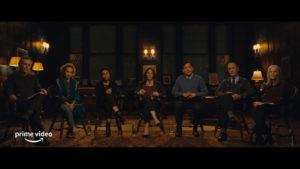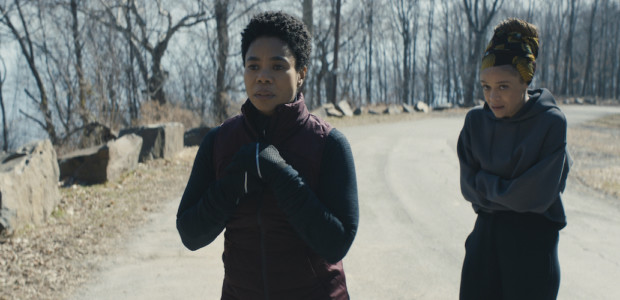It’s incredibly hard to prove a negative, how many times something didn’t happen since it’s impossible to know how many times it could have. This seems to be a major obstacle in helping folks see their privilege—how much they don’t have to do or don’t worry about. As a cishet white male, I’m at the top of the societal privilege food chain. Of course, I’ve known my own set of troubles and issues and all that, but those are not comparable to the various apparatuses built into our lives based on race, gender, or sexuality. I can sympathize and have an intellectual appreciation for these things—I can even empathize. But to experience and know such pervasive prejudice is beyond anything I will probably ever face, however fortunate for me and unfortunate for humanity. From writer/director Mariama Diallo, MASTER is about this ingrained hatred woven into the systems of our society from the settlers to present day. How it isolates, dehumanizes, and ultimately robs Black people of a future free from such constructs. Using familiar visual language from ghost stories and Italian horror films, MASTER presents the maddening effect of having to persuade people about a negative, about what they can’t see, and to entertain the possibility that it’s not only a choice to deny such biases but it’s part of the very design to enforce such structures.
Gail Bishop (Regina Hall) has just been made “master” of a dorm at Ancaster College, a prestigious and old university in New England. Her role is offering guidance and settling issues for the students living in that dorm, but it is also a step up the faculty ladder that could eventually land her the position of Dean. Jasmine (Zoe Renee) is a freshman living in Gail’s dorm, specifically in the room that has become the stuff of urban legends for a witch’s curse. Both Gail and Jasmine are Black, a very small minority of those at the school—which is made exceedingly obvious by the constant sea of white faces surrounding them in all places. Moving into the master’s house, Gail experiences weird phenomena like maggots suddenly appearing or ringing of ancient bells once used to summon the servants (and slaves). Meanwhile, Jasmine may have been marked by the vengeful spirit of a witch burned centuries before that drives her away from others and eventually to ruin. Their paths cross and overlap in multiple ways, but the two lives are essentially different stops along the same track that erases their perspectives and ignores any suggestions of something inherently wrong.
But in all seriousness, MASTER has many strengths, but a lack of developing the in-story mythology undercuts a lot of the weight of the messaging and emotions. If audiences are trying to unravel the mechanics of what is happening on screen—the basic who is doing what and how—then it makes it harder to be affected as much by the emotional aspects of the film. The film is perfectly acted with Hall and Renee being stellar in their roles, the two creating both a mirror reflection and a foil for the other. If Jasmine can suffer the slings and arrows of her racist schoolmates, then she can achieve greatness just like Gail…but has Gail really changed her own position in life just because of a title? That doubt eats away at the professor just as the maggots start consuming portraits and walls of the old residence. There are big moments in MASTER, parts that involve the (possibly) supernatural and scenes with excruciating emotions to explore, and they are met with aplomb by all the actors.

Bruce Altman also excels as the white Dean who seems like he stepped out of the GET OUT cast that uses progressive buzzwords while blinding himself from any reality (or perhaps something worse than merely ignoring the problems). Amber Gray plays Liv, one of the few other non-white professors at Ancaster, who offers some comfort to Gail, tries to push for some sort of action on the campus, and seems to constantly lock horns with her student Jasmine. Talia Ryder isn’t that realistic as Jasmine’s roommate, only because her bitchiness would probably be far more passive aggressive, but Ryder does well in the role that makes her an antagonist but also a victim of a whole other cycle of abuse. MASTER’s entire cast does a great job, with many people speaking in coded language to not say what they’re really saying while offering up Twitter Woke platitudes about visibility and authenticity.
Diallo’s feature film debut (after working on multiple shorts and TV episodes) doesn’t just boast great performances; there’s a specific visual language used that is not entirely like anything I’ve seen before. The filmmaker, working with her DP Charlotte Hornsby, marries the staid and cold world of New England horror (like THE WITCH) with the neon-drenched world of Argento (specifically SUSPIRIA). That mix of Italian over-the-top and the grounded earthen folk scares are reminiscent of Guadagnino’s SUSPIRIA or Fulci’s CITY OF THE LIVING DEAD. Those bright red lights seem to follow Jasmine, showing her trapped in a neon glow that is unnoticed by everyone else. There’s a direct visual reference to Argento’s seminal film with the silhouette of an old woman trying to confer wisdom to the young student, only for a certain kind of evil to be present. And the last piece of MASTER’s horror DNA is THE SHINING, with the ghosts of atrocities past permeating every brick of every room with the doomed resignation that this will happen again. After all, if America were a hotel, it would be the Overlook—a place packed with history of unspeakable tragedies that are brushed over repeatedly as the money comes in and sacrifices are made.
The story of MASTER is a powerful one that lands strongly. Black women trying to survive (and thrive) by the rules of a system designed to keep them out, but who are entangled in a continuing nightmare that started long before they arrived. However, the plot of MASTER is where things get hazy. Without going into too many specifics, the curse of the witch is vague as is the involvement of a puritanical sect that was created by Ancaster’s founder who still roam the woods in colonial garb like New England Amish. The symbolism of these things is clear, but the practical reasonings or rules for any of it isn’t. That messiness with the rituals and intentions of these (and other) malevolent forces creates a split from the central metaphors. The story of ingrained racism and social striation isn’t really entwined with a vengeful witch that seeks to take out a student in a particular room. And once viewers start questioning the point of certain matters, or even the logistics of how one family over a century can spawn a whole group of religious zealots that aren’t inbred nightmares, then the important allegory becomes less impactful.
There is a late narrative “twist” that works very well (and one that doesn’t), but too often MASTER feels like two different movies that could have been fine tuned into a more streamlined story that served both the horror mechanics and the social commentary. I can’t speak to the veracity of the experiences of Jasmine or Gail or offer any similar episodes from my own life. But that doesn’t mean MASTER is an impenetrable, alien tale devoid of any sense of access, empathy, or insight. Diallo’s script and the actors’ performances make the emotional truth of MASTER readily apparent and totally engrossing, but it would shine even brighter had it been properly married to the genre narrative threads instead of seeming like mismatched puzzle pieces.
MASTER is currently available to watch on Amazon Prime.
Tags: Amber Gray, American History, Animal Kingdom, Anna Van Patten, Big Indie Pictures, Bruce Altman, Charlotte Hornsby, City of the Living Dead, College, dario argento, Ella Hunt, Film Festivals, Folk Horror, Get Out, Horror, Italian, Kara Young, Luca Guadagnino, Mariama Diallo, Master, Meredith Lippincott, Neon Lighting, New England, Noa Fisher, PowerHouse VFX, Privilege, Race, Regina Hall, Robert Aiki Aubrey Lowe, Suspiria, SXSW, SXSW 2022, Systemic Racism, Talia Balsam, Talia Ryder, the lords of salem, the shining, The Witch, Tommy Love, University, Vassar College, Witch, Witchcraft, Zoe Renee



No Comments